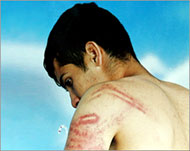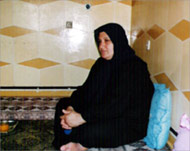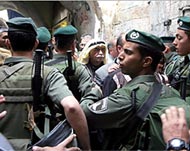Military crime without punishment
On 18 May Israeli troops stormed the house of Abu Anas Shamalakh during a massive raid on the Rafah refugee camp in the occupied Gaza Strip.

Uprooting trees in the garden and breaking down the main doors to the house, the troops locked the 43 members of the household into one room roughly four by two metres in size, and positioned their snipers on the top floor.
Eyewitness Umm Talat Shamalakh told Aljazeera.net that the occupation troops used members of the household as human shields, and tortured those who failed to obey their requests – in violation of the Fourth Geneva Convention.
The Shamalakh family’s story is not an exception, say human-rights groups. Rather it is symptomatic of a larger problem of abuse and misbehaviour that permeates the whole Israeli military apparatus.
Stories of abuse, torture and looting can be heard throughout the Rafah camp.
 |
|
Youths generally bear the brunt |
In May, 12 Israeli border policemen were detained for allegedly beating and robbing Palestinians, and nine others were arrested for beating and stealing money and other possessions from Palestinians near the West Bank city of Jenin.
Suhad Saq Allah of the Israeli human-rights group B’Tselem says it’s not a matter of one or two rotten apples in the Israeli military but of absence of deterrent punishment.
“The punishment they receive if convicted is ridiculous,” said Suhad, citing the example of an Israeli commander sentenced to four months in jail for killing a Palestinian child.
‘Blind eye’
B’Tselem says such “offensive sentences”, together with the Israeli Judge Advocate’s Office’s new policy of limiting the number of criminal investigations during the ongoing al-Aqsa Intifada, contribute to a sense of immunity and send a message to officers and soldiers that “even if you violate the regulations and harm innocent persons, it is extremely unlikely that you will be punished”.
|
“There is definitely Israeli military source |
“There is a certain degree of the military establishment turning a blind eye to this … they know what’s going on,” Suhad said.
“The military apparatus might not have clearly told [the soldier] to act in this way, but he can deduce that it’s okay from the punishments the others are getting – there is no restraint on them.
“So, he says to himself, ‘As long as what I am doing does not make it to the media, I can go ahead with it.’ It has to do with the system. We point the finger at the system,” Suhad said.
‘Code of Silence’
A source in the Israeli army reserve concurred with Suhad while speaking to Aljazeera.net on the condition of anonymity. The severity of the punishment and the enforcement of the law, he said, are simply not sufficient.
“If there is a trial, it will be only the soldier and the battalion commander. It’s what they call ‘discipline’: the soldier hears out the commander and says to him ‘Okay, sure’, then spends seven days in prison and no one except the unit will know about it, including the press.”
 |
|
Umm Talaat Shamalakh’s family |
The source also spoke of a “code of silence” and other unwritten laws and behavioural norms that prevail throughout the military apparatus.
These, together with lax enforcement of rules and disparate experiences and opinions within each unit, aggravate the problem, the Israeli source said.
“There is definitely much more going on and many more cases like that of [the border police] because of the IDF’s ‘code of silence’. They are protecting their mates. This is part of the reason that a large number of abuse cases have not even been revealed.
“I don’t trust the system. It’s hard, even when an investigation is open, to get to the truth,” the source said.
“They get some humanitarian training regarding these issues, but at the end of the day it still has a lot to do with the person’s individual views [on the situation].”
Soldiers indicted
Israeli army spokesman Major Eytan Arusi said what is happening in the border police is not happening in the army.
“The IDF operates within a legal framework and holds its entire body to the strictest standards of behaviour,” he said.
The IDF has conducted a total of 510 investigations into violence, theft, looting and general incidents of misbehaviour over the past three and a half years, since the start of al-Aqsa Intifada.
|
“The fact that the IDF conducts criminal investigations during intensive conflict is testimony to the high level of professionalism and morality embodied by the IDF” Major Eytan Arusi, |
Consequently, 81 soldiers have been indicted. Only one was convicted for shooting to death a Palestinian boy. His penalty was four months in jail and a reduction of rank.
Major Arusi was unable to say what kind of punishment soldiers convicted of other crimes, received.
“The fact that the IDF conducts criminal investigations during intensive conflict is testimony to the high level of professionalism and morality embodied by the IDF,” he said.
“We have an entire unit in the army devoted to teaching and instilling an ethical code within its soldiers and commanders.”
Approached for his views, Israeli military historian Martin Van Creveld said, “I suppose both statements are true as far as they go, but they don’t seem to be going very far, do they?”
Checkpoint incident
Iyad Alami of the Palestinian Centre for Human Rights is a lawyer who has been involved in cases of mistreatment of Palestinians by Israeli soldiers for over 13 years now.
He says the number of cases filed during al-Aqsa Intifada alone is in the thousands, not hundreds.
“I’ve filed literally thousands of complaints during this intifada. In about five of them, the [Israelis] said, ‘We are ready to provide compensation’.”
 |
|
Soldiers know they can get away |
One such case occurred at the beginning of the intifada, at the al-Tuffah checkpoint in Khan Yunis.
Two female soldiers stopped a Palestinian woman and forced her to drink a bottle of chemical solvent. As a result, the woman suffered internal burns and severe damage to her organs.
Subsequently, one of the soldiers was found guilty and imprisoned for a few days, and the woman’s medical expenses paid for.
But providing compensation does not translate into shouldering responsibility, says al-Alami. “They will never say ‘Yes we are thieves, here is your money’, if they were convicted in a looting case for example.
“They deny they committed such a crime at all. They say the state is not responsible for the harm done to civilians during raids.”
‘Tip of iceberg’
There are hundreds of other cases still pending, and many more that have not even been considered for investigation.
When questioned about these cases, the Israeli army spokesman, Major Arusi, said, “Before the intifada, the numbers were much lower. When you don’t work, you don’t make mistakes.”
“Our problem is not with the Palestinian people. It is with Palestinian terrorist organisations,” he said.
|
“There is never such a thing as a humanitarian occupation. In my view, anybody who serves in the territories is an actual or potential Martin van Creveld, |
“Our goal in combating terrorism is not hurting civilians and to this end we assist humanitarian agencies.”
Military expert Van Creveld called Major Arusi’s statement an oxymoron.
“There is never such a thing as a humanitarian occupation. In my view, anybody who serves in the [occupied] territories is an actual or potential war criminal.”
“I have no doubt that it is the tip of the iceberg,” he said referring to the recent arrest of Israeli border policemen for abuse and extortion.
“We are going to see and hear much more – in all branches of the military.”